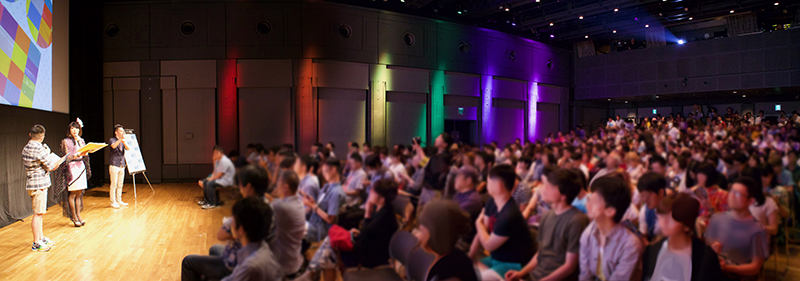ROUNDUP: RAINBOW REEL TOKYO 2017
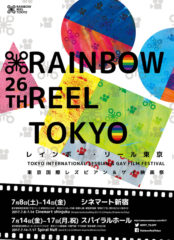
Tokyo’s Second Oldest Festival Retains Youthful Vigor
The Rainbow Reel Tokyo Film Festival kicked off its second quarter-century from July 9 - 18 in Shinjuku as well as its Omotesando home, Spiral Hall, attracting SRO crowds to its ongoing celebration of sexual minorities and gender fluidity. There is simply no better cinematic showcase for underrepresented voices and visions than this.
Cinema is perhaps our most persuasive tool for communicating messages of diversity and inclusion, and thus Rainbow Reel is an essential date on the festival calendar each year. But it isn’t only the festival’s lineup of the best new LGBT films that have made it thrive. Rainbow Reel also helps bring minority communities together, to foster discussion and debate, and to educate and encourage the vast number of Japanese who have yet to step out of the closet.
During its run in Omotesando, the Spiral lobby was thronged with pre- and post-screening visitors, escaping the heat to get drinks at the bar, select rainbow-colored souvenirs, peruse the many instructional/promotional pamphlets on display, and chat with filmmaking teams. The periodic announcement that champagne was free for all (courtesy of one of the many corporate sponsors) also contributed to the summer-festival ambience.

At the Spiral Hall kickoff, from left: Gengoroh Tagame (gay erotic manga artist),
Hideki Miyazawa (Committee Director, Rainbow Reel Tokyo), Onan Spelmermaid (MC, drag queen)
But as Rainbow Reel Director Hideki Miyazawa said in his greeting, “Some say that they’ve never seen sexual minorities. The reality is that they still find it hard to talk casually about themselves. Which comes first, brave sexual minorities speaking out, or those around them becoming more tolerant?”
This year’s 26th iteration did not have a landmark decision to celebrate as in past years, but with social media playing a crucial role, public dialogue has continued to expand. Considering that the 2020 Tokyo Olympics are just 3 years away and that its charter mandates equality, however, Japan’s gains have been snail-slow.
While Taiwan’s landmark May ruling made it the first Asian nation to legalize same-sex marriage — thus eclipsing LGBT news from Japan — one positive local development is that there are now six cities and wards (Shibuya and Setagaya wards in Tokyo, Takarazuka, Iga, Naha, Sapporo) recognizing same-sex partnerships, and an increasing number of companies have followed suit.
Earlier this year, Tomoya Hosoda became a city councilman in Iruma, Tokyo, the first openly transgender male to be elected to public office in Japan and one of only a handful around the world. But perhaps the biggest political gain has been the passing recognition of the conservative ruling coalition. Its platform for the Upper House elections in July stated that it would “promote understanding of sexual diversity.”
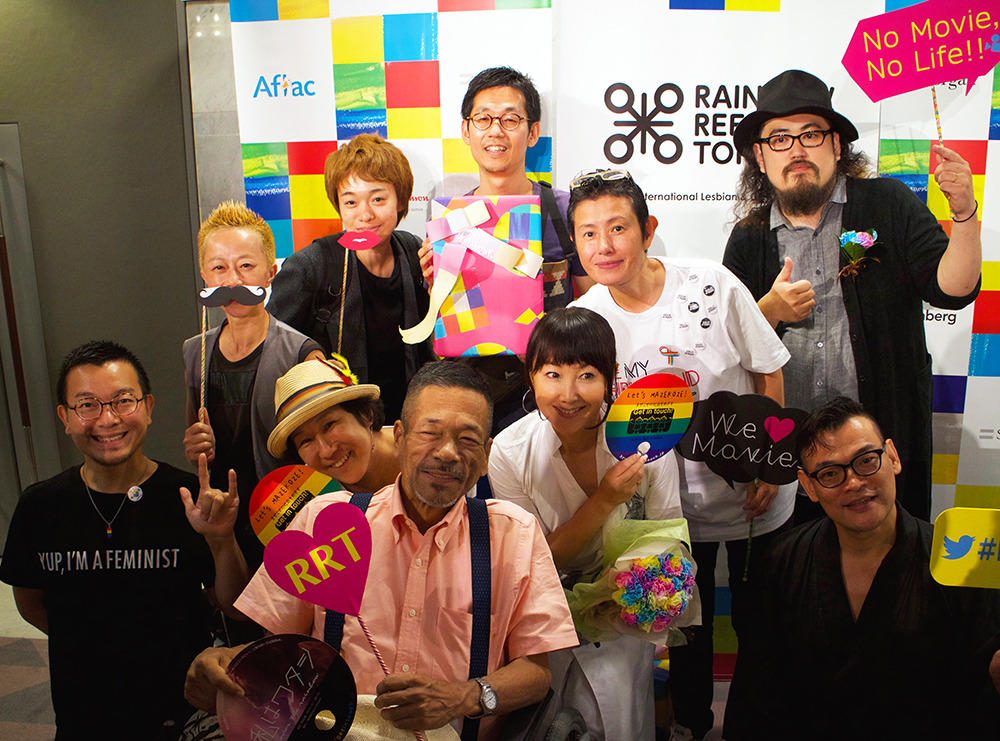 I Am What I Am: Over the Rainbow team: director Genki Masuda (back row, right),
I Am What I Am: Over the Rainbow team: director Genki Masuda (back row, right),
producer Chizuru Azuma (front right, with rainbow fan), Hiroshi Hasegawa (in pink shirt).
As in the US, where society has been convulsed by gender identity politics over the past few years, Japan-based outreach and advocacy organizations addressing such issues are proliferating. While each has a specific mission, the overall message now extends beyond embracing diversity for sexual minorities only, and encompasses the elderly, children and people with disabilities.
This was immediately evident in Genki Masuda’s I Am What I Am: Over the Rainbow. One of the two features in the 13-film main selection made by Japanese directors, this roughly shot and recorded documentary eventually surmounts its technical weaknesses to become essential viewing. Actress, producer and LGBT ally Chizuru Azuma interviews 41 members of Japan’s LGBT community in the film, and elicits literally dozens of hopeful messages for those conflicted about their sexuality, no matter what color their stripe.
Each speaker is helpfully identified by name, gender identification and professional affiliation, and one is struck by just how many nonprofit organizations and partnerships are currently advocating for change. There is much discussion of suicide, despair and “illness” — in Japan, one must be diagnosed as having gender-identity disorder before being allowed to legally transition from one sex to another — and much lamenting about the obsession with tidy gender categories (“Why can’t we be gender-free?” asks singer-songwriter Kiyotaka.) But the overall effect is positive and powerful.
I Am What I Am focuses a great deal of attention on Hiroshi Hasegawa, the founder of the gay magazines Badi and G-men, and an outspoken board member of JaNP+ (Japanese Network of People Living with HIV/AIDs). He is wheelchair-bound after a leg amputation that saved his life, and his is one of the most eloquent voices (particularly in the film’s opening poem/performance). The participants include a range of other prominent, as well as lesser-known, figures. The government is represented by Ken Hasebe, the Shibuya politican who launched the country’s first partnership registration certificates, and Ryotaro Nogata, current project manager of Shibuya’s partnership program. Peter, who starred in the 1969 queer masterpiece Funeral Parade of Roses and Kurosawa’s Ran, discusses “the unfathomable desire to put people in boxes;” and Aussie Matt Douglas, one of several foreign participants in the film, reminds, “We’re not fighting for special privileges.” But actress and former Miss International Queen Ai Haruna, a transgender female, sums up the film’s theme most succinctly: “Even in Japan, there are places for you.”
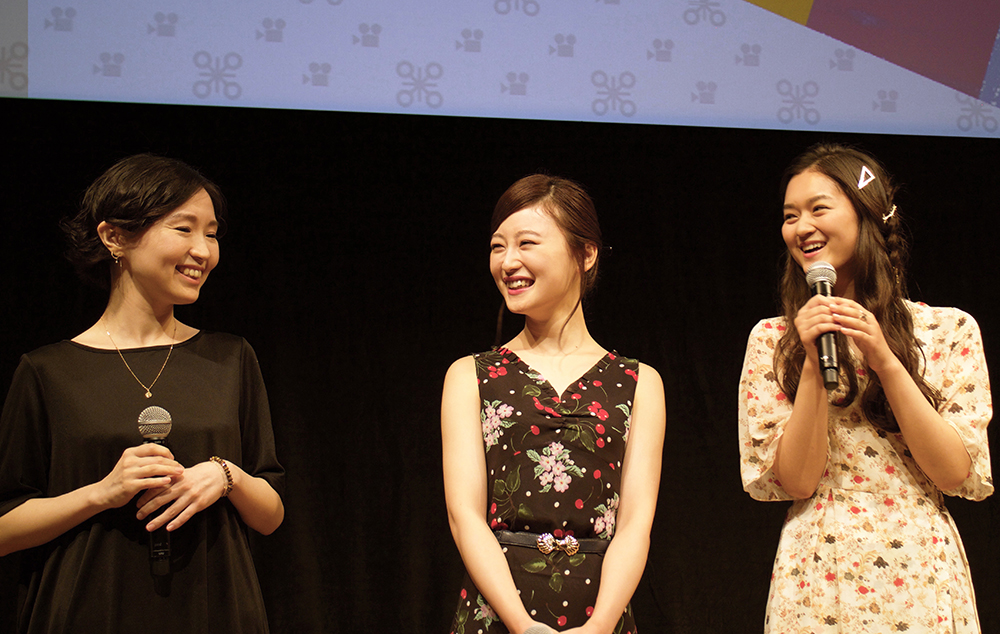 You Are the Sea director Tomoko Takahashi (left), and stars Miyu Wagawa and Tsukino Yamamoto
You Are the Sea director Tomoko Takahashi (left), and stars Miyu Wagawa and Tsukino Yamamoto
The other Japanese film in the Rainbow Reel lineup was Tomoko Takahashi’s indie feature You Are the Sea, a charming and surprisingly moving story told from the point of view of college student Kaito. Kaito and his buddy, Furuya, are completely mystified by women, but certain they can’t be trusted. They’re always leading men on, they gripe, sleeping with them “on a whim, to confuse us.” But then Kaito falls for his coworker at a small café, the always upbeat photographer Toko.
After a whirlwind romance, they start living together and all seems perfect until Toko meets an older woman, Hiroka, and begins spending a lot less time at home. Suffering horribly, Kaito soon guesses Toko’s secret; but rather than condemning her, he goes out of his way to make accommodations. He’s impossibly sweet to her, studies the book Coping with Alternative Lifestyles and even dresses in women’s clothes and puts on makeup (to impressive effect). Neatly flipping gender stereotypes on their heads, Takahashi’s film is tender and nurturing, just like its male protagonist. But lovers with Kaito’s level of empathy surely exist only in fairytales.
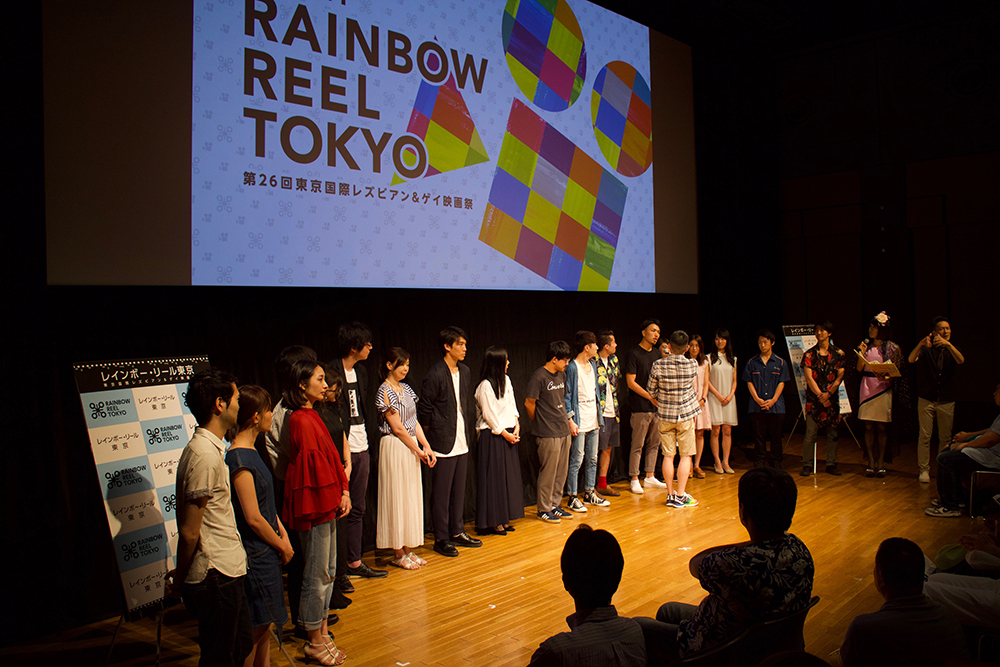 Filmmakers and actors from the six Rainbow Reel Competition titles take to the stage
Filmmakers and actors from the six Rainbow Reel Competition titles take to the stage
In the Rainbow Reel Competition, the six-film lineup of Japanese shorts included the inventive animated work Chromosome Sweetheart by Honami Yano, and the melodramas Dearest, by Kana Maruyama, and Spring Like Lovers, by Daisuke Shigaya, both about fraught gay relationships. There were no fewer than three high-school set titles, including Yuta Nagahama’s Eternal Sky, about lesbian lovers who are nearly driven apart when one wins the role of the heroine in the drama club’s new production and starts over-rehearsing with her male costar; and the truly goofy and joyous Are You Really Umekichi? by Naomi Takayama. Umekichi is a bullied geek who discovers that the most popular guy in school is actually a girl with GI disorder. She helps him transform into a cute ikemen, and they soon realize that every single classmate is not what they seem, after which the cast delivers the singing-dancing message that you shouldn’t go through life disguising yourself.
But the winner of the Audience Award’s ¥100,000 check and other sponsor prizes was the superlatively shot and acted Kalanchoe by Shun Nakagawa, about the unintended consequences of vicious rumors, after a high-school class is given a lecture about LGBT issues by their health teacher. “It’s not a disease nor abnormal,” she explains, and immediately, the students suspect someone in class must be gay. Before a classmate is finally outed, the secrets and lies grow pernicious and destructive in force.
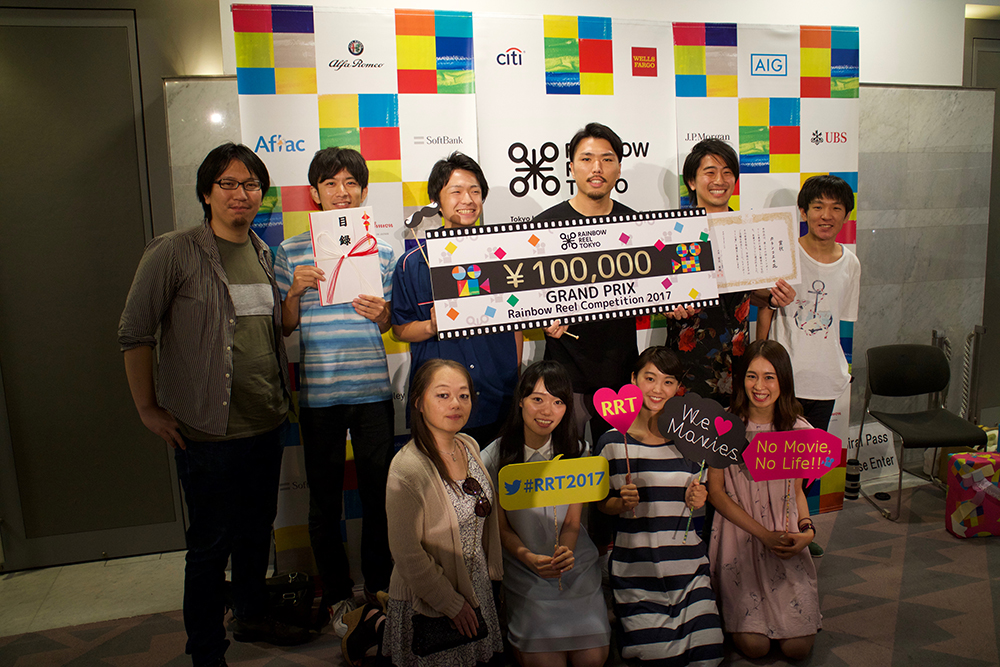 The stars of winning film Kalanchoe with director Shun Nakagawa (back row with beard)
The stars of winning film Kalanchoe with director Shun Nakagawa (back row with beard)
 At the closing ceremony, from left: Hide (fantastically animated sign language interpreter),
At the closing ceremony, from left: Hide (fantastically animated sign language interpreter),
Yoshihiro Masamichi (film writer and commentator), Hideki Miyazawa and Bourbonne
As always, Rainbow Reel also featured some of the most buzzed-about international LGBT titles of the past year, starting with opening film Fathers, from Thailand, which focuses on the tug-of-war that occurs when an adopted boy with two fathers is forced to spend time with his birth mother; April Mullen’s Below Her Mouth, a sexually daring drama about a passionate weekend affair; Sundance winner Kiki, which celebrates the 25th anniversary of the groundbreaking documentary Paris Is Burning by looking at how little has actually changed for today’s youth-of-color “ballroom” dancers, since LGBT gains have impacted predominantly the white and privileged; the charming Irish drama A Date for Mad Mary, about a female ex-con who finds unexpected love despite being socially ostracized; Jakob M. Erwa’s Center of My World, whose shiny, bouncy, fanciful approach to the story of a gay teen and his eccentric family have already made it one of the most widely distributed LGBT films; and maestro André Techine’s Being 17, about two boys in the south of France, sworn enemies at school — where both are shunned — who are forced to share the same roof and gradually realize they need each other.
As members of the Asia Pacific Queer Film Festival alliance (APQFAA), founded in 2015 to promote work from around the region, Rainbow Reel also presented six shorts from India, Pakistan, China, Taiwan, Australia and the US in the sidebar Queer x APAC: APQFAA Selection
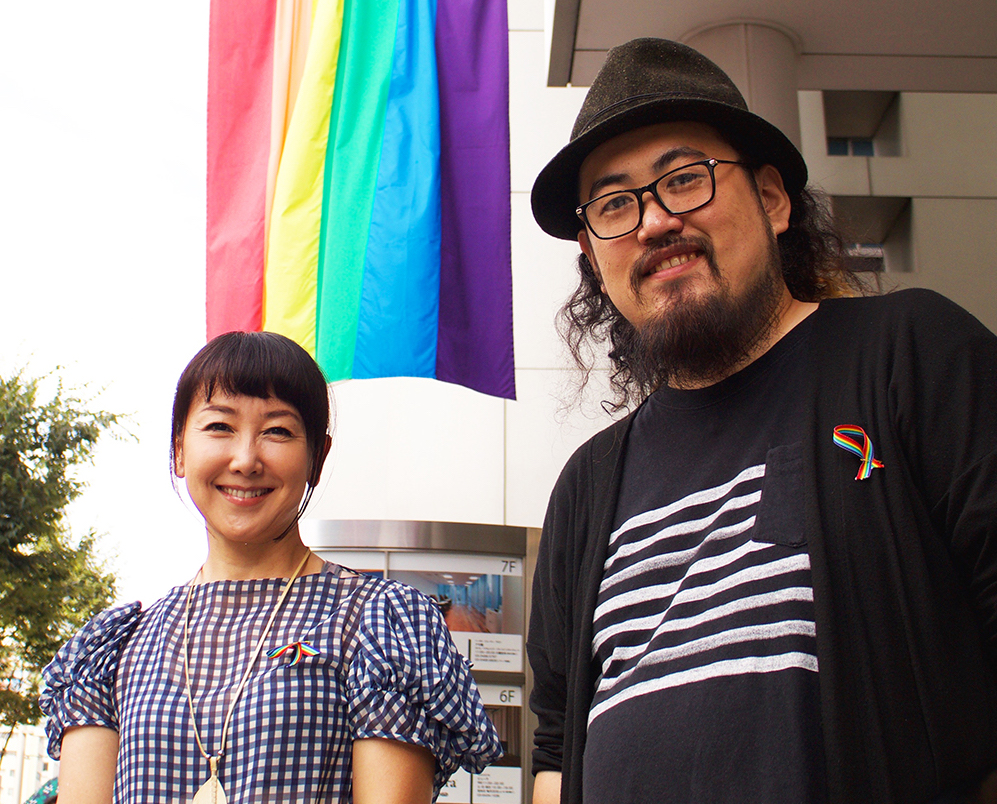 I Am What I Am's Chizuru Azuma and Genki Masuda in front of Spiral Hall
I Am What I Am's Chizuru Azuma and Genki Masuda in front of Spiral Hall
— KS
All photos: ©Koichi Mori

